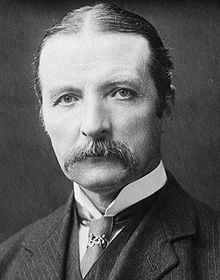William Archer (critic)
William Archer | |
|---|---|
 | |
| Born | 23 September 1856 Perth, Scotland |
| Died | 27 December 1924 (aged 68) London, England |
| Education | Middle Temple |
| Alma mater | University of Edinburgh |
| Occupation(s) | Writer, theatre critic |
| Spouse |
Frances Elizabeth Trickett
(m. 1884) |
| Children | 3 sons |
| Parent |
|
William Archer (23 September 1856 – 27 December 1924) was a
Life and career
Archer was born in
Archer won a
Archer played an important part in introducing Ibsen to the English public, starting with his translation of The Pillars of Society, produced at the Gaiety Theatre in 1880. It was the first play by Ibsen to be produced in London but was little known.[2] He also translated, alone or in collaboration, other productions of Scandinavian drama: Ibsen's A Doll's House (1889), The Master Builder (1893, with Edmund Gosse); Edvard Brandes's A Visit (1892); Ibsen's Peer Gynt (1892, with Charles Archer); Georg Brandes "William Shakespeare"; (1895) Little Eyolf (1895); and John Gabriel Borkman (1897); and he edited Ibsen's Prose Dramas (1890–1891).[3]
In 1881, Archer met Frances Elizabeth Trickett (1855–1929), the youngest of the eight children of John Trickett, a
In 1897, Archer, along with Robins, Henry William Massingham, and Alfred Sutro, formed the Provisional Committee to organise an association to produce plays they considered to be of high literary merit, such as Ibsen's. The association was named the "New Century Theatre" but was a disappointment by 1899, although it continued until at least 1904.[1] In 1899, a more successful association, named the Stage Society, was formed to replace it.[4]
Archer was an early friend of
Their intimate friendship could also be very turbulent, since both men were forthright and honest. Shaw respected Archer's intelligence and integrity, and penetrated his formality and deliberately cultivated dour Scots façade. Archer thought Shaw brilliant if perverse, and concluded that he never achieved his great potential because he was too much a jester.[1]
During the First World War, Archer worked for the official War Propaganda Bureau. After the war, he achieved financial success with his play The Green Goddess, produced by Winthrop Ames at the Booth Theatre in New York City in 1921. It was a melodrama, and a popular success, although, he admitted, of much less importance for the art of the drama than his critical work.[1]
Archer died in a London
[he] had his blind spots, as in his failure to understand
Strindberg, and Shaw, but he was incorruptibly honest and unwaveringly committed to the improvement of ... the theatre. His pioneering advocacy of Ibsen in England cannot be underestimated ... although his other contributions to the theatre are equally valuable.[1]
Archer and Walter Ripman compiled the first dictionary for the English spelling reform system NuSpelling, which would assist the development of SoundSpel.
Works
Critical works
- English Dramatists of To-day (1882)
- Henry Irving, a study (1883)
- About The Theatre: Essays and Studies (1886)
- Masks or Faces? A Study in the Psychology of Acting (1888)
- W. C. Macready, a biography (1890)
- Alan's Wife; a Dramatic Study in Three Scenes (1893)
- "The Theatrical World for..." (1893–97), in five volumes
- America To-day, Observations and Reflections (1900)
- Poets of the Younger Generation (1901) John Lane, the Bodley Head, London
- Real Conversations (1904)
- A National Theatre: Scheme and Estimates, with H. Granville Barker, (1907)
- Through Afro-America (1910)
- The Life, Trial, and Death of Francisco Ferrer(1911)
- Play-Making (1912)[5]
- India and the Future (1917)
- The Old Drama and the New (1923)
Essays
- The Great Analysis: A Plea for a Rational World-Order (1912). Introduction by Gilbert Murray
Plays
- War Is War (1919)
- The Green Goddess (1921)
Notes
- ^ doi:10.1093/ref:odnb/30435. Retrieved 28 December 2017. (Subscription or UK public library membershiprequired.)
- ^ a b Drabble 2000, pp. 37–38
- ^ a b Chisholm 1911.
- ^ Woodfield 1984, pp. 56–58
- ^ William Archer (1912). Play-making: A Manual of Craftsmanship. Small, Maynard. Retrieved 2 February 2016.
References
- Archer, Lt.-Col. Charles (1931). William Archer: Life, Work and Friendships. London: Allen & Unwin. (US edition: Yale University Press)
- Caton, A. R. (1936). Activity and Rest: The Life and Work of Mrs. William Archer. London: Philip Allan & Co.
- Drabble, Margaret, ed. (2000). The Oxford Companion to English Literature (sixth ed.). Oxford and New York: Oxford University Press. ISBN 978-0-19-861453-1.
- Whitebrook, Peter (1993). William Archer. A Biography. London: Methuen.
- Woodfield, James (1984). English Theatre in Transition, 1881–1914. London: Routledge. ISBN 978-1-138-93465-8.
- This article incorporates text from a publication now in the public domain: Chisholm, Hugh, ed. (1911). "Archer, William". Encyclopædia Britannica. Vol. 2 (11th ed.). Cambridge University Press. p. 362.
External links
 Works by or about William Archer at Wikisource
Works by or about William Archer at Wikisource- William Archer on SF Encyclopedia
- Works by William Archer at Project Gutenberg
- Works by or about William Archer at Internet Archive
- Works by William Archer at LibriVox (public domain audiobooks)

- Papers of William Archer at Edinburgh U. Library
- Archer, William (1918), India and the Future, New York: Alfred A. Knopf
- Article by Martin Quinn in Dictionary of Literary Biography
- William Archer at Library of Congress, with 128 library catalogue records
